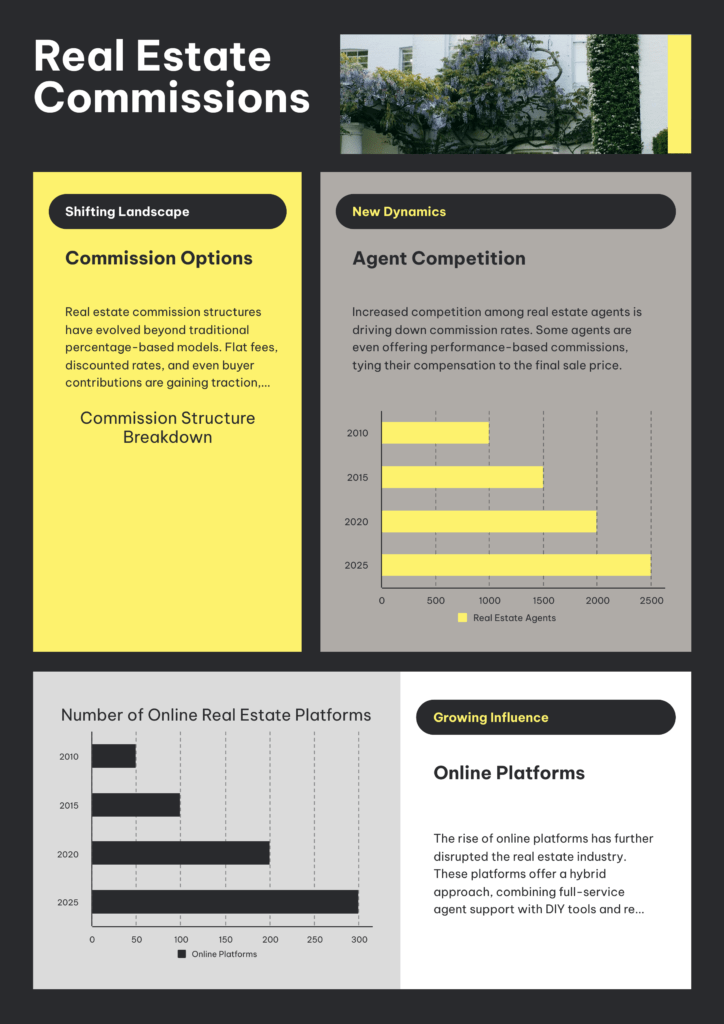The year 2024 marks a significant turning point in the real estate industry. A series of new real estate rules and regulations have been implemented, aimed at increasing transparency, fairness, and efficiency in the buying and selling process.
The New Real Estate Rules Commissions Controversy
For decades, real estate commissions have been a source of debate and controversy. The traditional model, where sellers typically pay a commission to both the listing agent and the buyer’s agent, has faced criticism for being opaque and potentially anti-competitive. Critics argued that the commission structure stifled negotiation and limited consumer choice.
Critics have argued that this commission structure:
Limits Consumer Choice: By requiring sellers to pay a commission to both agents, the traditional model can limit buyers’ options. It may discourage buyers from working with agents who charge lower fees or offer different services.
Stifles Negotiation: The standard practice of splitting the commission between the listing agent and the buyer’s agent can make it difficult for buyers and sellers to negotiate more favorable terms. Some argue that this system creates a perceived incentive for agents to prioritize their own interests over those of their clients.
Lack of Transparency: The way real estate commissions are calculated and paid can be opaque to consumers. Many buyers and sellers may not fully understand how commissions are determined or why they are so high.
The Settlement
In response to a class-action lawsuit alleging that the National Association of Realtors (NAR) and certain brokerages had conspired to fix real estate commissions, a settlement was reached in 2024. This settlement, approved by a federal judge, introduced several significant changes to the way real estate commissions are paid and negotiated.
The lawsuit alleged that the NAR and brokerages had colluded to maintain artificially high real estate commissions, limiting consumer choice and hindering competition. The settlement, which involved a substantial financial payment from the defendants, required them to implement several significant changes to the way real estate commissions are paid and negotiated.
Key aspects of the settlement included:
Elimination of Seller-Paid Buyer Agent Commissions: The settlement mandated that sellers are no longer required to pay a commission to the buyer’s agent. This practice, known as “seller-paid buyer agent commissions,” had been a longstanding industry standard.
Increased Transparency: The settlement required real estate agents to provide more upfront information about fees and charges to buyers and sellers. This included disclosing commission rates, transaction fees, and any other costs associated with the sale.
Restrictions on Buyer Agent Offers: The settlement limited the ability of listing agents to offer incentives to buyer’s agents, such as a portion of their commission. This practice, known as “buyer agent offers,” was seen as a way to artificially inflate prices.

Key Changes to Real Estate Rules Commissions
Elimination of Seller-Paid Buyer Agent Commissions: One of the most significant changes is the elimination of the practice where sellers are required to pay a commission to the buyer’s agent. Under the new rules, buyers are responsible for paying their own agent’s commission. This shift is expected to increase transparency and give buyers more control over their costs.
Mandatory Disclosure of Fees: Real estate agents are now required to disclose all fees and charges to buyers and sellers upfront. This includes commission rates, transaction fees, and any other costs associated with the sale. Greater transparency will empower consumers to make informed decisions.
No More “Buyer Agent Offers”: Listing agents can no longer offer buyers’ agents a portion of their commission as an incentive to bring buyers to their listings. This practice, known as “buyer agent offers,” was criticized for artificially inflating prices. The elimination of buyer agent offers is expected to level the playing field and reduce seller costs.
What Does This Mean for Homebuyers and Sellers?
The new real estate commission rules have significant implications for both homebuyers and sellers.
For homebuyers:
Potential Cost Savings: Buyers may be able to save money by paying their own agent’s commission, especially in competitive markets.
Increased Negotiation Power: With greater transparency and control over their costs, buyers may have more leverage in negotiations.
Need for Clear Agreements: Buyers should ensure they have a clear written agreement with their agent outlining the terms of their representation, including fees and commission.
For home sellers:
Reduced Costs: Sellers may benefit from reduced costs by no longer being responsible for paying the buyer’s agent commission.
Increased Competition: The elimination of buyer agent offers may lead to increased competition among buyers’ agents, potentially resulting in better deals for sellers.
Importance of Effective Listing Agents: Sellers should choose listing agents who have a proven track record of marketing properties effectively and negotiating favorable terms.
Beyond Commissions: Other Rule Changes
In addition to the changes in real estate commissions, other significant rule changes have been implemented in 2024. These include:
Increased Disclosure Requirements: Agents are now required to disclose more information about potential conflicts of interest and any material defects in properties.
Technology Adoption: The industry is embracing technology to improve efficiency and transparency. This includes the use of digital contracts, virtual tours, and online marketplaces.
Focus on Consumer Protection: The new rules are designed to protect consumers and ensure fair practices in the real estate market.
The 2024 real estate rule changes represent a significant step forward in terms of transparency, fairness, and consumer protection. By addressing long-standing concerns about commissions and other industry practices, these changes are expected to have a positive impact on the buying and selling process for both consumers and professionals alike. As the industry continues to evolve, it is essential for buyers and sellers to stay informed about the latest regulations and trends to make informed decisions.
Frequently Asked Questions
Real Estate Commissions
Q: How does the elimination of seller-paid buyer agent commissions affect homebuyers?
A: Buyers may be able to save money by paying their own agent’s commission, especially in competitive markets. However, they should be aware of any additional fees charged by their agent.
Q: Can sellers still negotiate commission rates with their listing agents?
A: Yes, sellers can still negotiate commission rates with their listing agents. The new rules do not eliminate the ability to negotiate fees.
Q: What are the potential benefits of the new commission rules for sellers?
A: Sellers may benefit from reduced costs by no longer being responsible for paying the buyer’s agent commission. Additionally, increased competition among buyers’ agents could potentially result in better deals for sellers.
Other Rule Changes
Q: What are the increased disclosure requirements for real estate agents?
A: Agents are now required to disclose more information about potential conflicts of interest, material defects in properties, and any relevant disclosures mandated by local laws.
Q: How is technology being used to improve the real estate industry?
A: Technology is being used to streamline processes, improve transparency, and enhance the overall buying and selling experience. This includes the use of digital contracts, virtual tours, and online marketplaces.
Q: What are the key consumer protection measures included in the new rules?
A: The new rules are designed to protect consumers by increasing transparency, ensuring fair practices, and providing greater oversight of real estate transactions.
Overall Impact
Q: How will these rule changes impact the overall real estate market?
A: The long-term impact of these rule changes is still uncertain. However, they are expected to increase transparency, fairness, and consumer protection, which could ultimately benefit both buyers and sellers.
Q: Are there any potential drawbacks to the new rules?
A: Some critics argue that the new rules may lead to higher overall costs for buyers and sellers, as agents may seek to offset the loss of commission revenue. Additionally, there may be concerns about the impact on smaller real estate firms.
Q: What should homebuyers and sellers do to prepare for the new rules?
A: Homebuyers and sellers should stay informed about the latest regulations and trends. They should also work with experienced real estate agents who are knowledgeable about the new rules and can provide guidance and support throughout the buying or selling process.










